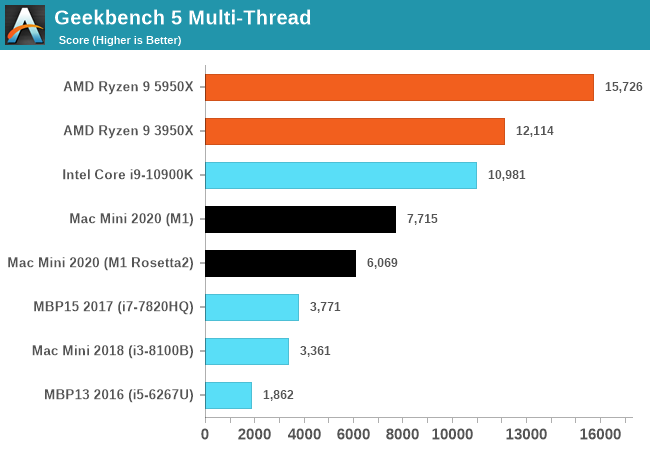

BENCHMARKS DELETED GEEKBENCH OVER CHEATING CODE
> For Linux, the required code can be seen e.g. > that prohibits access, when root/admin rights would be required. > the CPU cycles with a performance counter, unless there is a security setting > On these processors it is easy to measure the average CPU frequency, by counting > hundreds or thousands of Geekbench results exist, but all are garbage because they are not comparable. > Anyway, these frequency values are interesting especially > the benchmark should not record the average clock frequency, but where possible, it should be recorded. > where access to the performance counters is prohibited, > On a processor without performance counters or on a system > not worthwhile, because they must be calibrated for each processor model) timing integer divisions or other long instructions are > To obtain the number of CPU cycles, there is no other good way except using one performance > In all modern processors TSC is incremented at a constant frequency, regardless what the processor cores do. > The link from Stackoverflow is obsolete. Dividing the 2 numbers provides the average frequency. > of CPU cycles from test start to test end. > The duration of the test is already measured by any benchmark, you just need one extra number, the count > Where it is possible, it is not difficult.
BENCHMARKS DELETED GEEKBENCH OVER CHEATING WINDOWS
> Some good links there, but it is easier on Linux than Windows (big surprise), but it is possible. > I agree, but this is a difficult problem because of turbo/thermal throttling, etc.

> systems, where the overclocking problem exists, it could be done using one performance counter. > possible on all platforms, but at least on Intel/AMD > It would be great if the Geekbench tests would also measure the average clock frequency during the test A platform named UL Benchmark even removed Oppo’s Find X and Oppo F7 from its platform over “high and misleading” scores in 2018.> Maynard Handley on Aug12:01 pm wrote: Companies like Huawei, OnePlus, and Oppo have been found cheating benchmark scores in the past. This is not the first time a smartphone manufacturer has been caught cheating benchmark results. The benchmark platform also said that it questioned Realme after finding out the discrepancies, but received no response. The smartphone allegedly used mosaic colour blocks instead of processing the image verbatim genuinely, to reduce its quality and cut down processing efforts, the company said.ĪnTuTu also said that both delaying threads and modifying the reference image are against the purpose of giving fair benchmark results. Apart from that, AnTuTu also said that the Realme GT modified the reference JPG image used by the platform to reduce processing times and achieve a higher score. This allowed the smartphone to use the fastest CPU cores, resulting in higher benchmark scores, AnTuTu said. The benchmarking platform said that the Realme GT delayed threads when running the multithreaded test on its benchmark app. The Realme GT was marketed with a score of over 7,50,000 on the AnTuTu version 8. On the other hand, regarding the test issues doubted by both sides, we are in touch with Antutu to sort it out positively.”

Realme has always been committed to bringing users excellent performance, the actual user experience is the top priority for Realme. Benchmark scores of Realme GT are all accurate data under the current versions of the Antutu benchmark. In a statement to News18, Realme said, “Realme GT is equipped with the latest Snapdragon 888 5G platform, bringing users high performance. Realme, in its response, refuted the allegations made by the benchmarking platform, saying that the scores of Realme GT are all accurate data. AnTuTu said that it would otherwise remove Realme GT permanently from its listing. It claimed that Realme manipulated the results of the Realme GT’s performance in the multi-threaded workload and JPG decoding sections of the AnTuTu app.ĪnTuTu has said that it has decided to remove the Realme GT from its platform for three months, and has given the Chinese brand an ultimatum to provide clarity on the benchmark cheating, and modify the system to avoid manipulating results. AnTuTu posted a note on its Weibo account in order to inform users about the removal of the Realme GT from its benchmarking platform. Realme GT, the flagship offering from the Chinese brand Realme has been removed from benchmarking platform AnTuTu for allegedly cheating the benchmark tests. AnTuTu said that the Realme GT delayed threads when running the multithreaded test on its benchmark app.


 0 kommentar(er)
0 kommentar(er)
